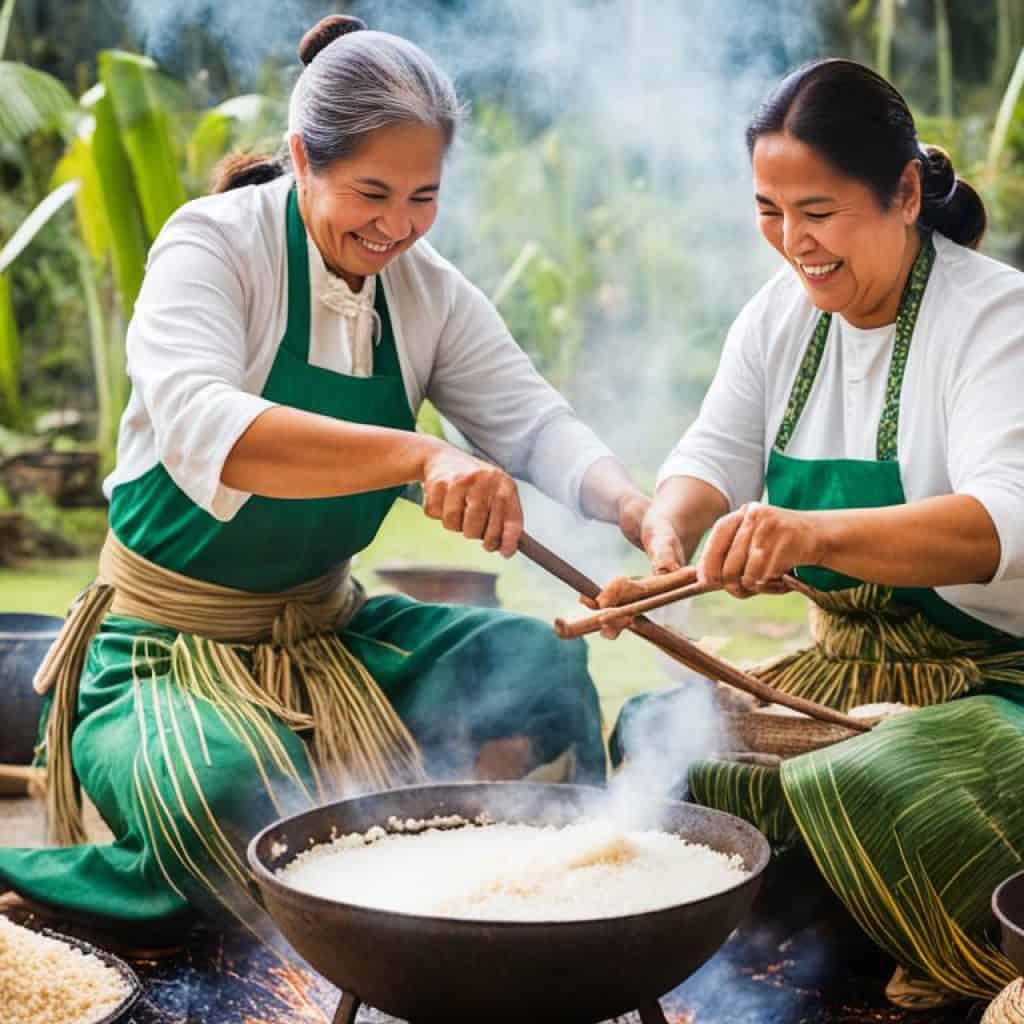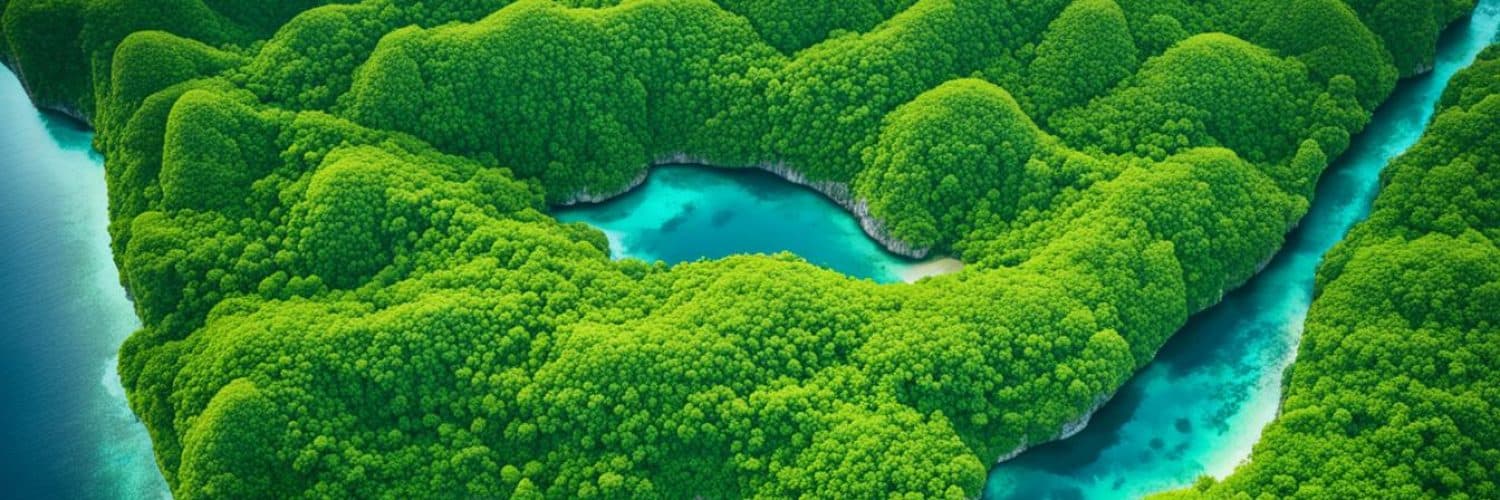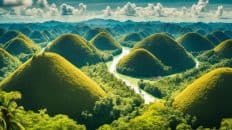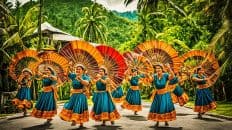Where is Bohol? It’s an island treasure in the Philippines, filled with beauty. Known for its stunning beaches, the unique Chocolate Hills, and a deep cultural background, it’s a place of wonder. Situated in the Visayas region, Bohol blends nature and history, mesmerizing all who visit. Let’s take a closer look and see what makes Bohol so special.
Key Takeaways
- Bohol is an island in the Philippines’ Visayas region.
- It boasts beautiful beaches, the iconic Chocolate Hills, and a lively craft culture.
- There are easy ways to get there, like flights to Tagbilaran City or ferries from other islands.
- Visiting local artisans and buying their crafts can support them.
- You can explore wonderful sites like the Chocolate Hills and see rare tarsiers.
Bohol Island: A Gem in the Philippines
Welcome to Bohol, a hidden gem in the Visayas region of the Philippines. It might not be as famous as Boracay or Palawan, but it gives visitors a captivating experience. With its stunning sights and dive spots, the island is a paradise for explorers.
Bohol is the 10th largest island in the Philippines and easy to reach. It’s tucked between Cebu and Leyte, making it a great spot for travelers. You can fly or take a ferry to get here, each journey filled with excitement for the adventures ahead.
Upon arrival, Bohol impresses with its beautiful landscapes, untouched beaches, and cultural richness. It’s famous for the Chocolate Hills, an amazing natural sight. These hills look like giant chocolate drops in the dry season, which is how they got their name.
But the island is not just about the Chocolate Hills. It’s also known for its colorful marine life, a hit among divers and snorkelers. Dive into the clear waters to see vibrant coral reefs and unique sea creatures.
Travel through Bohol’s scenic countryside to find historical sites, like the Baclayon Church and the Man-Made Mahogany Forest in Bilar and Loboc. These places show off the island’s history and culture.
In Bohol, natural beauty and cultural heritage come together beautifully. Here, you can enjoy nature, see history up close, and make unforgettable memories.
Come and see the beauty of Bohol Island for yourself. Whether you’re looking for adventure, relaxation, or to connect with nature and history, this Philippine gem has everything you need.
Getting to Bohol: Transportation Options
Are you planning a trip to Bohol? Here are some easy ways to get there and begin your journey.
Fly to Tagbilaran City
Flying to Tagbilaran City is the easiest way to get to Bohol. This city is the heart of the province. It has an airport that connects to Manila and other key cities in the Philippines. Many airlines provide flights to Tagbilaran, making access to the island smooth.
Ferry or Fast Craft from Cebu
Already in Cebu? Consider a ferry or fast craft to Tagbilaran City. Cebu is a crucial travel hub with regular trips to Bohol. The ferry trip lasts about two hours. It lets you see beautiful sea views.
Ferry Connections from Nearby Islands
Traveling from nearby islands? Bohol is reachable by ferry from places like Leyte or Siquijor. Ferry services make it easy to get to Tagbilaran City from these locations.
“Getting to Bohol is easy with many transport options. You can fly, take a ferry, or use a fast craft. Soon, you’ll be in this paradise!”
Once you get to Bohol, get ready to be amazed. You’ll see the famous Chocolate Hills and experience the local culture. Bohol has something special for every visitor.
Exploring the Artisan Culture of Bohol
Bohol is famous not just for its stunning landscapes but also for its rich tradition of craftsmanship. The island hosts talented artisans. They keep alive crafts handed down from their ancestors. From sweet calamay made in Alburquerque to strong metalwork in Loay, Bohol offers a chance to meet and support these incredible craftsmen.
“Bohol’s artisan culture is a testament to the island’s creativity and craftsmanship,” notes Maria Lopez, a travel blogger. “Discovering the art scene lets you dive into Bohol’s cultural root while helping local artisans.”
Art lovers should not miss the Alburquerque Artisans Village. This place is full of calamay producers, known for their sweet treats. Made from sticky rice, coconut, and sugar, you can watch them work. You might even try making some yourself.
For those curious about metal, Loay is the destination. There, blacksmiths produce quality tools with ancient methods. Seeing their work firsthand is fascinating.
Table of Bohol Artisan Experiences
| Artisan | Location |
|---|---|
| Calamay makers | Alburquerque |
| Blacksmiths | Loay |
Discovering Bohol’s artisan culture does more than support local creators. It lets you connect with the community and learn about the island’s rich traditions and heritage.
Calamay Makers: Sweet Creations from Alburquerque
In the town of Alburquerque, located in Bohol, Philippines, talented calamay makers work. They create delectable treats using sticky rice, coconut milk, sugar, and selected ingredients.
These makers focus on keeping the authentic flavors and methods alive. They’re proud to use traditional techniques passed down through generations. This ensures every batch of calamay is made with great care.
Making calamay is a labor of love. Large woks cook the sticky rice mixture slowly over an open fire. Stirring and heat blend the ingredients into a thick, sticky consistency.
This process lets the flavors merge, creating a rich and satisfying sweet treat.

The production of calamay in Alburquerque happens in locals’ backyards, not in big factories. This keeps the tradition alive and preserves a part of the culture.
Buying calamay helps support these makers and their livelihoods. Your support boosts the local economy, helping artisans maintain their craft.
Visiting Alburquerque? Meet the calamay makers and see how they work. You’ll enjoy the tastes and smells of this culinary tradition. This experience will give you a greater appreciation for their artistry and dedication.
Calamay Makers in Alburquerque: A Taste of Bohol’s Artisanal Heritage
Exploring Bohol isn’t complete without trying Alburquerque’s calamay. The makers’ skill and passion are evident in every bite, offering a genuine taste of Bohol’s artisanal heritage.
Enjoy calamay by itself or with other local foods like bibingka or suman. Each bite is a delicious nod to Alburquerque’s culinary traditions and craftsmanship. Don’t forget to bring some of these treats home as souvenirs or gifts.
Salt Makers: Asin Tibuok from Alburquerque
For a taste of ancient salt making, head to Alburquerque, Bohol. There, Tan Inong Manufacturing Corporation creates Asin Tibuok. This unique salt showcases the craft of skilled makers.
The process starts by soaking coconut husks in saltwater. This lets them pick up natural minerals. After some days, these husks are then dried in the sun. This step makes the salt taste and feel better.
Once dried, the husks are burned with precision. This creates ashes that are used to filter and collect concentrated brine. The brine goes into traditional clay pots.
These pots are placed over a fire to evaporate the brine. Slowly, salt starts to form. The final product, Asin Tibuok, is unique in shape. It looks like a dinosaur or dodo egg, sparking the imagination.
“The ancient process of salt making in Alburquerque connects us to our cultural heritage,” says local historian Juan Dela Cruz. “It honors the salt makers across generations.”
The salt from Alburquerque is more than a seasoning. It tells the story of tradition and dedication. Buying it supports the local economy and keeps the culture alive.
The Artistic Craftsmanship of Salt Making
The salt makers show their skill at every step. They select husks, refine brine, and evaporate it just right. Each phase demands expertise.
Alburquerque’s salt makers have perfected their art over centuries. They pass down their invaluable knowledge. Their commitment keeps the tradition of Alburquerque thriving.
Supporting Local Communities
Supporting these artisans helps the local community. It keeps a rich tradition going. Your purchase helps these craftsmen continue their work and share their skills.
Don’t miss Alburquerque’s salt making when in Bohol. Dive into this intricate process. Enjoy Asin Tibuok‘s unique flavor and bring home a part of Bohol’s artisanal heritage.
Blacksmiths: Forging Tradition in Loay
Loay, in the island of Bohol, is famous for its blacksmiths. These artisans excel in metalwork, crafting tools like the Filipino bolos. Their work combines passion and centuries of tradition.
When you visit Loay, the blacksmithing process comes alive. Workshops echo with hammer sounds and the warmth of the forge. Molten metal becomes detailed tools under their hands.
“Blacksmithing is more than a craft for us; it’s a part of our culture and lifestyle,” mentions Juan dela Cruz, a Loay blacksmith. “We honor our ancestors and keep their story alive through our art.”
In Loay, blacksmiths welcome visitors. They’re eager to showcase their skills and share their craft’s history. As you watch, you learn how blacksmithing has developed.
Looking for a unique tool or blade? Commission a piece from these craftsmen. Each item reflects their skill and Bohol’s rich heritage.
Loay’s blacksmithing keeps the town’s culture and economy vibrant. Supporting these artisans helps preserve a historic craft and aids community growth.
The Legacy Continues
The blacksmiths of Loay are dedicated to their tradition, despite changing times. Their work ensures blacksmithing’s survival, drawing interest from all over.
Chocolate Tablea Makers: El Tablea in Baclayon
Baclayon, a charming town in Bohol, is known for El Tablea. This family-run business values the Filipino tradition of hot chocolate. Their tablea comes from pure cacao beans. It is a key part of Boholano culture because of its rich flavors.
At El Tablea, you can see how tablea is made. The family farm is a beautiful place for this. Guests learn about the hard work that goes into making tablea. This includes everything from picking cacao beans to the final molding.
The process starts with picking the best cacao pods. The beans are then fermented and sun-dried, which brings out their flavor. After drying, they roast and grind the beans. Finally, they mold them into tablea disks. This tradition showcases real Filipino hot chocolate.
Drinking hot chocolate from El Tablea is special. It feels like stepping back in time. The aroma and smoothness of the drink highlight Filipino skill.
“The journey from bean to tablea is a labor of love. It honors our ancestors’ traditions and keeps Filipino hot chocolate important. We’re proud to share this with visitors in Baclayon. They can see the hard work and love we put into every tablea batch.”
The History of Filipino Hot Chocolate
Filipino hot chocolate has a long history. The Spanish brought it during colonial times. It became a big part of Filipino culture. Chocolate tablea is used in many traditional dishes and drinks.
Tablea makes a rich hot chocolate called “tsokolate”. Filipinos drink it on special occasions. It goes well with rice cakes and Filipino bread rolls. This makes it a favorite treat for many.
El Tablea helps keep the tradition of tablea making alive. By visiting and supporting them, you get to enjoy a tasty drink and help preserve Boholano culture.
Discovering Bohol’s Natural Wonders
Bohol isn’t just about its vibrant art. It’s rich in natural wonders that amaze everyone. It boasts the Chocolate Hills and tiny tarsiers among its many sights. Each visit to this Philippine island is an adventure.
The Chocolate Hills are a must-see in Bohol. Over 1,200 cone-shaped hills cover the island. In the dry season, they turn brown, looking like chocolate. This sight is truly breathtaking.
Panglao Island is another gem in Bohol. Its beaches and clear waters make it a paradise. Here, you can relax on the sand, swim, or explore coral reefs. Panglao Island is perfect for everyone.
The Man-Made Mahogany Forest is also a wonder. Tall mahogany trees create a calm atmosphere. Walking here, you can enjoy the cool shade and fresh air. It’s a peaceful break from the heat.
The Baclayon Church is a piece of history in Bohol. Built by the Spanish, it’s one of the oldest stone churches in the Philippines. Its beauty and history show the rich culture of Bohol.
Experience Bohol’s wonders firsthand. Explore the Chocolate Hills, enjoy Panglao Island, visit the Mahogany Forest, and see Baclayon Church. Make memories that last forever.
| Top Attractions in Bohol | Keywords |
|---|---|
| Chocolate Hills | chocolate hills, bohol tourist spots |
| Panglao Island | best places to visit in bohol, top attractions in bohol |
| Man-Made Mahogany Forest | man-made mahogany forest, Bilar, Loboc |
| Baclayon Church | historic Baclayon Church |
Tarsiers: Delightful Primate Marvels
Don’t forget to see the tarsiers when in Bohol. These tiny primates with big eyes live here. Seeing them up close is a must. Always remember to be responsible and considerate.

“Bohol’s natural wonders offer an unparalleled experience of awe and serenity. Explore the magnificent Chocolate Hills, bask in the beauty of Panglao Island, wander through the enchanting Man-Made Mahogany Forest, and delve into the rich history of the Baclayon Church. Discover the magic of Bohol’s natural treasures today.”
Bohol calls to all with its stunning beauty and landscapes. It’s perfect for adventurers, nature lovers, and history buffs. Embark on a journey to see Bohol’s best and create memories to cherish forever.
The Enchanting Chocolate Hills
The Chocolate Hills are a famous landmark in Bohol. These hills are cone-shaped and covered in grass. When it’s dry, the grass turns brown, making them look like chocolate. There are over 1,200 of these hills in an area of more than 20 square miles. Visiting these hills is a magical experience. It shows the beauty of nature.
Picture yourself on top of a hill, looking at mounds that go on forever. The Chocolate Hills are stunning. They charm everyone who sees them.
Some say giants made the Chocolate Hills by throwing rocks and soil. But science explains they are limestone formations made by weathering and erosion over millions of years.
Seeing the Chocolate Hills is astonishing due to their number and look. They have green grass in the rain season, which is stunning. But in the dry season, they turn brown like chocolate.
Viewing the Chocolate Hills can be done from decks or by hiking or biking. Either way, the views will amaze you. It’s a peaceful place for thinking and taking photos.
“The Chocolate Hills are a natural wonder. Seeing these hills in green or brown is magical.” – Local resident
The Chocolate Hills also have lots of plants, insects, and animals. This makes exploring them even more exciting and adventurous.
If you love nature, adventure, or amazing sights, you should see the Chocolate Hills in Bohol. They show how beautiful and diverse our planet is. They remind us of the wonders that exist in this enchanting place.
The Man-Made Mahogany Forest in Bilar and Loboc
The Man-Made Mahogany Forest in Bilar and Loboc showcases the might of reforestation. This road, surrounded by tall mahogany trees, offers a calm and beautiful view. It’s a place where nature’s beauty is on full display.
This forest was made to fight back against the harm done by harmful farming. Local people and groups worked together to plant these trees. They wanted to bring back the area’s natural beauty and encourage caring for the environment.
Traveling through the forest, you’ll see the tall trees forming a green roof. This roof lets through specks of sunlight, lighting up the path. It’s a peaceful spot, away from the noise and rush of daily life.
“The Man-Made Mahogany Forest is a beautiful testament to what can be achieved when communities come together to protect and preserve their environment.” – Local Conservationist
Walking in the forest shows how vital reforestation is for nature. It’s a home for many plants and animals, supporting life. This forest is full of life and serves as a home for wildlife.
This forest reminds us of our duty to care for our planet. It’s proof that when we work together, we can make a positive change. It shows us the impact of our actions on the environment.
Stop for a moment in this forest and take everything in. Look up at the trees and breathe the clean air. Let this place inspire us to keep and love the beautiful nature around us.
Protecting the Endangered Tarsiers of Bohol
Bohol is a beautiful island in the Philippines. It’s famous for its landscapes and as a home for the Philippine tarsier. These small primates with big eyes are endangered and need our help.
Visiting Bohol means we should be careful tourists to help these creatures. The Loboc Tarsier Conservation Area is popular but has been criticized. The conditions there can be bad for the tarsiers.
Instead, we can visit places like the Correla’s Philippine Tarsier and Wildlife Sanctuary. These places work hard to protect the tarsiers. They allow us to see these animals safely and help them survive.
Sanctuaries for Responsible Tourism
| Sanctuary Name | Location | Features |
|---|---|---|
| Correla’s Philippine Tarsier and Wildlife Sanctuary |
Corella, Bohol | |
| Philippine Tarsier Recreation Inc. | Tawala, Panglao Island, Bohol | |
| Tarsier Conservation Area (Tarsier Research and Development Center) |
Corella, Bohol |
Choosing certified sanctuaries helps both tarsiers and local people. It supports efforts to save these unique animals and their habitats.
Conclusion
Bohol Island is an amazing place for a vacation. It’s beautiful, full of culture, and welcomes everyone. If you love adventure, chilling out, or exploring new cultures, Bohol is perfect.
Discovering the art of calamay making in Alburquerque is a treat. The Chocolate Hills are a must-see too. Every part of Bohol has something special to offer.
Visit Panglao Island for its stunning beaches and marine life. The Man-Made Mahogany Forest in Bilar and Loboc shows Bohol’s love for nature. You can also meet the cute tarsiers at Correla’s Philippine Tarsier and Wildlife Sanctuary, in a kind way.
Plan your dream trip to Bohol Island for unforgettable memories. It’s ideal for any type of traveler. So, pack your bags, book your flight, and get ready for adventure. Experience the wonder of Bohol for yourself.


















Add comment